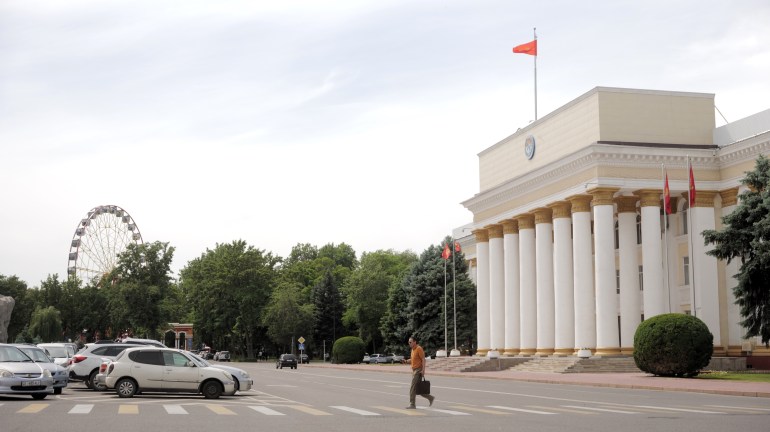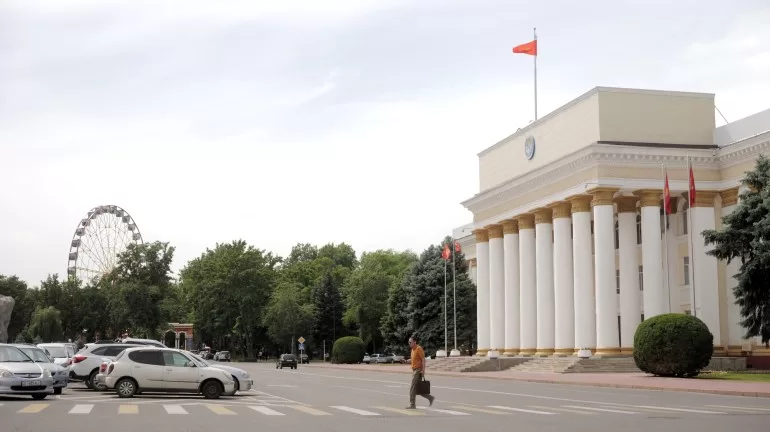Bishkek, Kyrgyzstan and Warsaw, Poland – Last year, Aidai Irgebai had a serious talk with her two sons, aged nine and seven.
The boys would not return to their school in Bishkek, Kyrgyzstan’s capital, when the holiday break was over, Irgebai told them. In fact, they may not return home at all.
They were in Warsaw, Poland’s capital, where Kloop, a well-known investigative media outlet that Irgebai works for, had set up a new office pre-emptively, fearing the consequences of a growing crackdown against independent journalism in Kyrgyzstan.
With hindsight, that seems like a prescient move.
Before the summer ended, state prosecutors shut Kloop down, claiming that it was not properly registered as a media organisation. Kloop is appealing the decision.
“They can easily silence us by putting pressure on our children. I’m not very good at keeping quiet, so it became clear that I had to stay abroad to continue working as a journalist,” Irgebai, 34, told Al Jazeera in Kloop’s office in central Warsaw.

Kyrgyzstan has gone through three revolutions over the past 20 years and has long been viewed as the freest post-Soviet republic in Central Asia.
The last revolution in 2021 brought to power President Sadyr Japarov, who in tandem with security services chief Kamchybek Tashiev has ruled the country since, gradually strengthening their grip on power.
This has become difficult, however, as the number of critical voices and professional investigative teams rose, having been developed over the years of relative freedom.
Kloop and other Kyrgyz media have investigated high-level corruption, such as in 2020 when Kloop and its partners revealed that a powerful former customs official oversaw a large-scale transnational scheme, or in May this year, when damning reports implicated people close to Japarov.
Japarov appears determined to challenge them.
In 2021, a new law obliged NGOs to file complex tax reports as human rights activists were starting to be seen as agents of a Western agenda and LGBTQ propaganda. According to Eurasianet, the MP championing the law has positioned herself as for against “Western ideology” and suggested LGBTQ advocacy leads to higher divorce rates.
In 2022, the parliament passed a “false information” bill which gave the government more power to remove unwanted online content. Under the law, the state can force an outlet to remove content it deems to be false information. Activists say it’s a form of censorship.
A few months later, Kyrgyzstan blocked the website and bank accounts of Radio Azattyk – the Kyrgyz service of Radio Free Europe/Radio Liberty, citing counterterrorism and anti-money laundering reasons. Jamie Fly, the organisation’s chief, promised to appeal the court’s “outrageous decision”. In July 2023, a Kyrgyz court overruled the government’s decision.
By 2023, Kyrgyzstan plummeted by 50 places to 122 from 72 in Reporters Without Borders’s annual press freedom ranking.
In January 2024, 11 former and current reporters for the Temirov Live investigative group were arrested, having been charged with calling for mass riots. Its office was raided and documents were confiscated while its founder, Bolot Temirov, was stripped of his Kyrgyz citizenship and deported to Russia as he holds a Russian passport.
In April 2024, Japarov signed the foreign agents law mirroring the Russian legislation which requires NGOs receiving funding from abroad to register as “foreign representatives” and undergo additional auditing processes.
Now, a new media law is currently in the works. Once passed, civil society groups say it will give the government the power against registering “undesirable” media without citing legal grounds. The government claims that the current law does not reflect the challenges of contemporary media, especially online journalism.
‘Unprecedented crackdown on free press in Kyrgyzstan’
“The recent unprecedented crackdown on free press in Kyrgyzstan is the authorities’ direct response to the investigative reporting by Kloop and Temirov Live – both members of the Organized Crime and Corruption Reporting Project,” Gulnoza Said, of the Committee to Protect Journalists, told Al Jazeera.
“They uncovered corruption by the highest-level officials, including the head of the Kyrgyz security services and family members of President Japarov. The reaction of the authorities was to suppress these voices.”
Kloop no longer believes in the rule of law back home. As part of a trial last February, several psychiatrists testifying on behalf of the state said that the website’s content affected Kyrgyzstanis’ mental health by upsetting people with negative information.
“Most journalists from our team who were threatened directly are already out of the country,” said Rinat Tuhvatshin, 40, head of Kloop. He left Kyrgyzstan in 2020 and is now based in Warsaw.
“It’s hard to switch to remote model of work, but we had to develop new mechanisms to continue operating. If they can stop us, they can stop anyone”.
But the authorities do not agree with the diagnosis of the country’s democratic backsliding.
“According to the annual report of the Reporters Without Borders, the Kyrgyz Republic has improved its performance compared to 2023 and moved up two places – from 122nd to 120th place,” Chyngyz Esengul uulu, Kyrgyzstan’s deputy minister of culture, information, sports and youth policy and the chairman of a group working on the new media law, told Al Jazeera.
“We can confidently say that Kyrgyzstan maintains its position in the ranking, confirming its commitment to democratic values and support for an open society. This is a source of national pride which demonstrates the country’s significant efforts to strengthening freedom of speech and media independence.”
But an apparent crackdown continues. In early July, Akyn Askat Zhetigen, a local folk poet and singer, continuing the old Kyrgyz tradition of oral socio-political commentary, was sentenced to three years in prison for criticising the government on social media.
“There is systematic repression of anyone who tries to speak freely. Dozens, if not hundreds, of regular people who said something online that the authorities did not approve of now languish in prisons,” Tuhvatshin, Kloop’s founder told Al Jazeera.
Al Jazeera was unable to independently verify the claim, since state officials do not release data about prisoners.
“In part, the government’s actions are caused by fear. They are afraid of the people of Kyrgyzstan, of their own people. Japarov – because a revolution brought him to power. Tashiev – because he can be fired any day. I think they’re also afraid of each other,” added Tuhvatshin.
Meanwhile, other investigative media outlets are trying to navigate the new reality.
Dilbar Alimova, the 39-year-old editor-in-chief of the PolitKlinika website, which reports on social and political issues, feels like the pressure on free media intensified with Japarov’s coming to power.
PolitKlinika’s office was raided in 2020 by unknown perpetrators and sued a year later by a state media channel for allegedly reporting fake news about international loans taken by Japarov. There were also several attempts between 2018 and 2022 to block the website. In January, one of PolitKlinika’s employees, Tynystan Asypbek – also a former employee of Temirov Live, was arrested. His house was searched and his property was confiscated. He remains under house arrest.
“The government has succeeded in making us divided and weak. Now every journalist and activist exercises self-censorship,” Alimova said, sitting in her Bishkek office.
“But they will not break us. Kyrgyz people love independence and have proven it more than once. In one way or another, journalists will find a way to speak up.”
